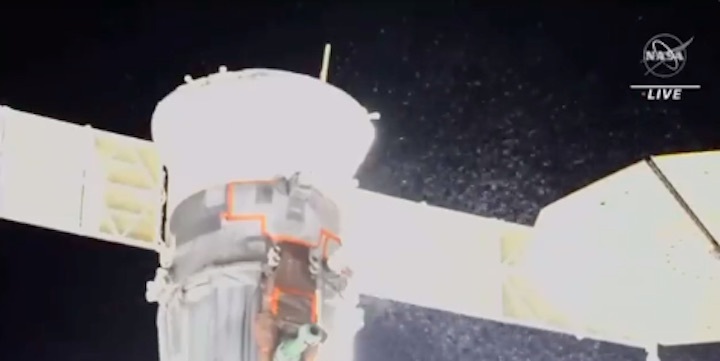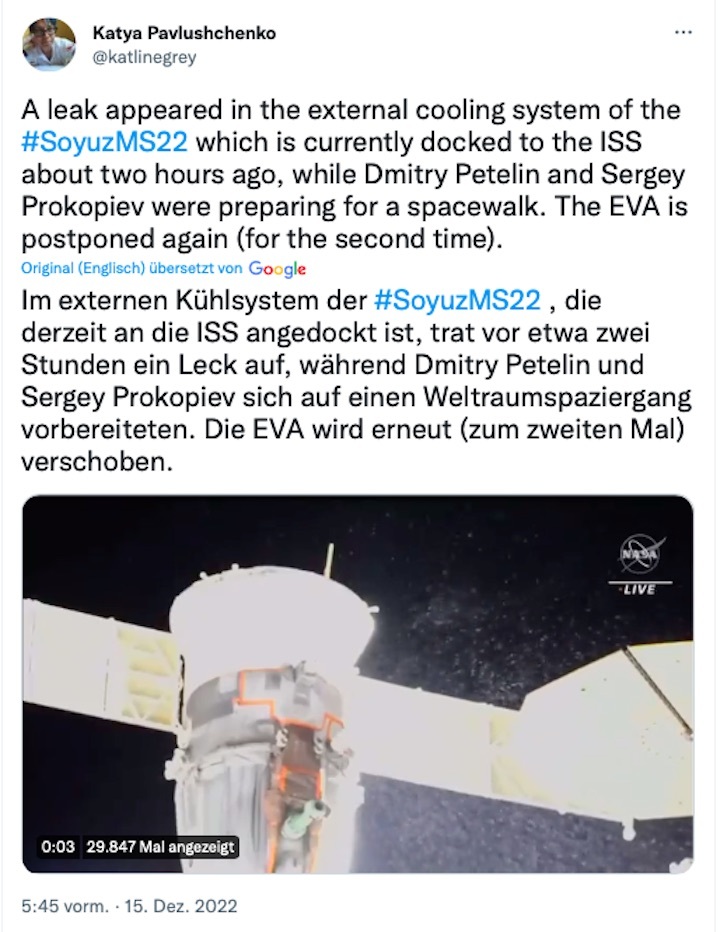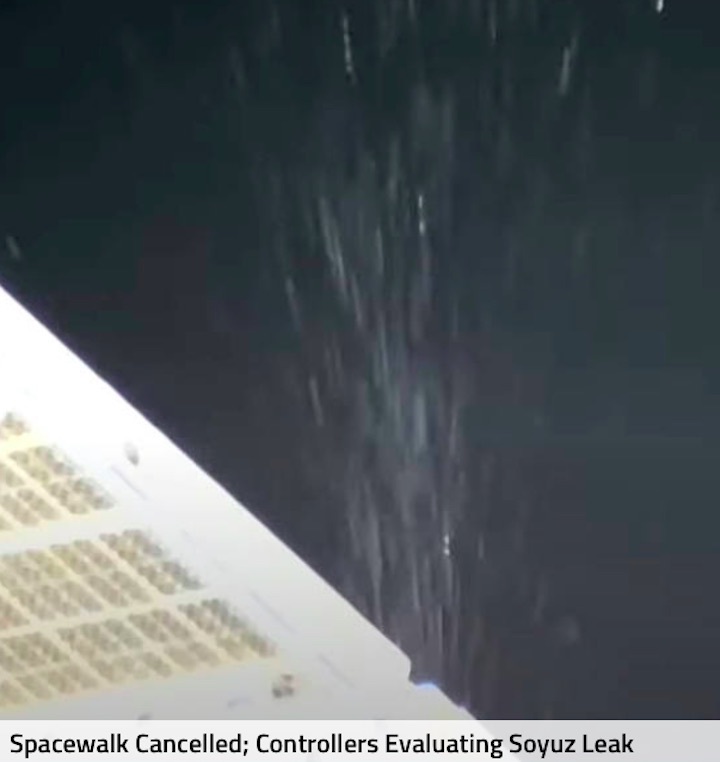MOSCOW, December 15. /TASS/. The Russian Soyuz MS-22 manned spacecraft docked to the International Space Station (ISS) sustained damage to its external casing, the Roscosmos press office reported on Thursday.
"According to the preliminary information, the external casing of the Soyuz MS-22 crew spacecraft’s instrumentation and equipment compartment was damaged on Thursday, December 15," the press office said in a statement.
As Roscosmos specified, the crew later reported an activation of the sensor of the spaceship’s fault detection system that signaled a drop in pressure in the cooling system.
"The visual inspection confirmed the leaking, following which a decision was made on interrupting scheduled extra-vehicular activities by ISS Russian segment crewmembers Sergey Prokopyev and Dmitry Petelin," the statement says.
Roscosmos female cosmonaut Anna Kikina made photos and video footage of the spaceship’s external surface with the help of a camera on the ERA robotic arm.
"The data has been transmitted to Mission Control and specialists have begun studying the images," Roscosmos said.
Spacewalk cancellation
The Roscosmos press office reported earlier on Thursday that the commission was currently analyzing the incident with a system of the Soyuz MS-22 spacecraft, following which a decision would be made on further activities by ground teams and cosmonauts aboard the ISS.
Roscosmos announced earlier on Thursday that the scheduled spacewalk had been cancelled over technical reasons. As a Mission Control specialist specified during communications with the cosmonauts, the extra-vehicular activity was cancelled over a coolant leak in the Soyuz MS-22 spacecraft docked to the orbital outpost. Meanwhile, the integrity of the spaceship from inside was not impacted, it said.
During cosmonaut Prokopyev’s previous space expedition, a hole was found in the habitation module of the Soyuz MS-09 spaceship parked at the ISS. At that time, Prokopyev and his teammate Oleg Kononenko had to make a spacewalk to examine the spaceship’s external surface.
Quelle: TASS
----
Update: 16.12.2022
.
Micrometeorite possibly behind Russian space capsule leak
A Russian space official says a coolant leak from a Russian space capsule attached to the International Space Station could have been caused by a micrometeorite strike
MOSCOW -- A coolant leak from a Russian space capsule attached to the International Space Station could have been caused by a micrometeorite, a Russian space official said Thursday.
Russia's space corporation Roscosmos and NASA both said that the incident hasn't posed any danger to the station's crew. However, the leak prompted a pair of Russian cosmonauts to abort a planned spacewalk earlier in the day.
Sergei Krikalev, a veteran cosmonaut who serves as the director of crewed space flight programs at Roscosmos, said a meteorite striking one of external radiators of the Soyuz MS-22 capsule could have caused the coolant to escape.
The malfunction could affect the performance of the capsule's coolant system and the temperature in the equipment section of the capsule but doesn't endanger the crew, Krikalev said in a statement.
Krikalev said Russian flight controllers were assessing the situation and following temperature indicators on the Soyuz. “There have been no other changes in parameters on the Soyuz spacecraft and the station, so there is no threat for the crew,” he said.
NASA emphasized on Thursday that “none of the crew members aboard the space station was in danger, and all conducted normal operations throughout the day.”
It seconded the Russian statement, saying that “the external radiator cooling loop of the Soyuz is the suspected leak source.”
“Roscosmos is closely monitoring Soyuz spacecraft temperatures, which remain within acceptable limits,” NASA said in a statement, adding that “NASA and Roscosmos continue to coordinate external imagery and inspection plans to aid in evaluating the external leak location. Plans for an additional inspection of the Soyuz exterior using the station’s Canadarm2 robotic arm are underway.”
As Russian cosmonauts Sergey Prokopyev and Dmitri Petelin were about to venture outside the station on a planned spacewalk early Thursday, ground specialists saw a stream of fluid and particles on a live video feed from space, along with a pressure drop on instruments, emanating from the Soyuz capsule.
Prokopyev, Petelin and NASA astronaut Frank Rubio used the capsule to arrive at the International Space Station in September, and it serves as a lifeboat for the crew.
Krikalev said the station’s future operations would depend on an assessment of the capsule’s condition. “Decisions about the future flight program will be made on the basis of that analysis,” he said.
Along with Prokopyev, Petelin and Rubio, four other crew members are currently on the space outpos: NASA astronauts Nicole Mann and Josh Cassada, the Japan Aerospace Exploration Agency's Koichi Wakata and Anna Kikina of Roscosmos.
Quelle: abcNews
----
Update: 21.12.2022
.
Commission to decide on damaged Soyuz MS-22 spacecraft by December 27 — Roscosmos chief
Working groups will formulate their expert view on the Soyuz MS-22 manned spacecraft whose coolant system was damaged by December 27, Roscosmos Head Yury Borisov said on Monday.
"I believe that at the end of December, somewhere on the 27th [of December], specialists - and now two working groups have been set up - will decide on how we will resolve this situation," the Roscosmos head said in an interview with the daily Izvestia.
There is plenty of time for making decisions and "there is no hurry," Borisov stressed.
"If the situation is under control and we are fully confident in the spaceship’s working capacity, it will be used for the crew’s standard descent as was planned in March. If the situation develops under a different scenario, we, of course, have backup options," the Roscosmos chief said, adding that the crew could return to Earth aboard another spaceship, the Soyuz MS-23.
The Russian space agency has set up two working groups to look into the emergency, analyze the Soyuz MS-22 spacecraft’s technical condition and work out recommendations for further actions by Mission Control specialists and the crew of the ISS Russian segment. They will scrutinize all the data transmitted from the ISS and the Soyuz MS-22 spacecraft.
Coolant leak at Soyuz MS-22 spacecraft
On December 15, a drop in pressure in the Soyuz MS-22 manned spacecraft’s external cooling loop was recorded as Russian cosmonauts were preparing for their scheduled spacewalk. A visual inspection of the spacecraft from the orbital outpost confirmed the coolant leak, which cancelled the spacewalk.
As Roscosmos reported, Roscosmos flight controllers conducted a series of tests of the Soyuz MS-22 spaceship’s systems, including a test of its propulsion control system that involved short-term activation of its berthing and attitude thrusters. The tests revealed that there were no other faults found.
On December 18, the Soyuz MS-22 spacecraft’s external surface was inspected with the help of cameras aboard the space station. The analysis of the data transmitted to Earth helped detect a potential leak in the spacecraft’s instrumentation/equipment compartment. According to preliminary data, the damage could have been caused by a micrometeoroid or space debris striking the external cooling loop located on the Soyuz MS-22 spacecraft’s instrumentation/equipment compartment.
Roscosmos to prepare backup spacecraft for cosmonauts’ return to Earth
MOSCOW, December 19. /TASS/. A backup spacecraft to bring cosmonauts aboard the International Space Station (ISS) back to Earth will be prepared by February 19 and the spaceship is currently undergoing tests at the Baikonur spaceport, Roscosmos Chief Yury Borisov said on Monday.
"Of course, we have backup options. We will prepare the spaceship faster. Instead of the scheduled March descent, we will prepare it somewhere by February 19. It is already installed at the Baikonur spaceport and undergoing all the tests," the Roscosmos head said in an interview with the daily Izvestia.
"In this situation, we will simply undock the Soyuz MS-22, it will descend to Earth and we will send a second spaceship to bring back the crew," Borisov said.
On December 15, a drop in pressure in the Soyuz MS-22 manned spacecraft’s external cooling loop was recorded as Russian cosmonauts were preparing for their scheduled spacewalk. A visual inspection of the spacecraft from the orbital outpost confirmed the coolant leak, which cancelled the spacewalk.
Quelle: TASS
+++
Evaluation reveals 0.8mm hole in Soyuz MS-22 spacecraft — Roscosmos
A preliminary inspection of the Soyuz MS-22 spacecraft docked to the International Space Station (ISS) revealed a tiny hole in the spaceship’s instrumentation compartment, Roscosmos Head Yury Borisov said on Monday.
"The preliminary inspection revealed that there is a tiny hole there measuring about 0.8mm, which caused the leak," the daily Izvestia quoted the Roscosmos chief as saying.
The Roscosmos head characterized the situation as "not very pleasant." However, he rejected the speculation that the temperature inside the spaceship had increased to plus 50 degrees Celsius.
On December 15, a drop in pressure in the Soyuz MS-22 manned spacecraft’s external cooling loop was recorded as Russian cosmonauts were preparing for their scheduled spacewalk. A visual inspection of the spacecraft from the orbital outpost confirmed the coolant leak, which cancelled the spacewalk.
As Roscosmos reported, Roscosmos flight controllers conducted a series of tests of the Soyuz MS-22 spaceship’s systems, including a test of its propulsion control system that involved short-term activation of its berthing and attitude thrusters. The tests revealed that there were no other faults found.
The temperature inside the Soyuz MS-22 spacecraft has stabilized at plus 30 degrees Celsius, Roscosmos said.
"In the first days after the leak, the tests of the systems revealed that the temperature reached plus 30 degrees Celsius in the Soyuz MS-22 spacecraft’s habitation module and plus 40 degrees Celsius in its instrumentation/equipment compartment. However, in the last few days, as the spaceship’s systems were switched off, the temperature in its compartments stabilized at plus 30 degrees Celsius," Roscosmos said.
The temperature increase inside the Soyuz MS-22 spacecraft is within acceptable limits and uncritical both for equipment and the cosmonauts’ health in case of their presence inside the spaceship, Roscosmos said.
Quelle: TASS
----
Update: 24.12.2022
.
Russia may send empty Soyuz to bring ISS crew home
Russia's space agency says it is considering sending an empty spacecraft to the International Space Station (ISS) to bring home three crew members ahead of schedule, after their Soyuz capsule started leaking.
Roscosmos and Nasa said it was unclear how the external radiator on the spacecraft sustained a tiny puncture.
They have ruled out the impact of a meteor.
The leak started as two cosmonauts were preparing for a routine spacewalk.
A decision is yet to be made about how exactly the three crew members will be brought back to Earth.
The most likely option is to send another Soyuz spacecraft to collect them.
A less likely option is sending them home in the leaky capsule without most of its coolant, which regulates temperatures inside the crew compartment of the spacecraft.
The vehicle - known as MS-22 - flew Russian cosmonauts Dmitry Petelin and Sergey Prokopyev, as well as Nasa astronaut Frank Rubio, to the station in September.
But it began spraying coolant into space earlier this month, with Nasa TV capturing dramatic images of white particles streaming out of the capsule like snowflakes.
Joel Montalbano, Nasa's ISS program manager, said late February would be the most likely time to launch another Soyuz. The crew were due to return in March.
Nasa says that none of the crew are in danger.
The capsule is currently being vented with air flow allowed through an open hatch to the space station, Mr Montalbano said.
The ISS was launched in 1998 and is located about 400 km from the Earth.
Cosmonauts carry out tests and research at the station that will help future space missions.
Quelle: BBC



